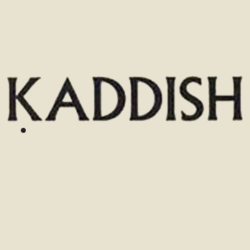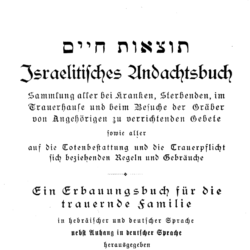Contributor(s): Shared on: Categories: Tags: DOWNLOAD: PDF
As some folks may recall, I worked on a “secular” ḳaddish after my mother died so that I could say ḳaddish under circumstances where I could gather ten people but not ten Jews. I continued to work on this ḳaddish and have been sharing it with people in my home community, and people seem to really love it and get a lot out of it. So I thought I would share it with you all now (even though most will probably only see it after Rosh Hashanah), because you may find it useful in two ways: 1) As a kind of prayer for Creation in the spirit of the Rosh Hashanah liturgy that hopes for the time when “all creatures become united in one band” to serve God. 2) As an alternative ḳaddish to do at any point in the service where people might get benefit from something that they can read in English. As such this is not a replacement for kaddish but it might work as one of several ḳaddishes that get said in a service.
| Contribute a translation | Adapted Source (English) |
|---|
|
[Mourners:]May the Name that fills all names
be blessed and strengthened in this created world. May the Breath of Life that fills all breaths fill us with Life,
and may it guide and rule our actions and visions,
in our lives and in our time,
now in this world,
and in every moment to come. And let us say: Amen. | |
[Everyone:] Amen. May that great Name be blessed within us
and in all worlds,
for all time. | |
[Mourners:]May Holiness stream forth from its Source,
full of blessing and beauty. May the Name that weaves all Life
be blessed and praised,
made beautiful and resplendent,
lifted up and exalted,
to the highest and most majestic… ([Everyone:] Blessed be!)
…beyond all the praises and blessings
and songs and prayers
that can ever be said in the whole world. And let us say: ([Everyone:] Amen.) | |
[Mourners:]May the Life and Love
within us and between us
be strengthened. May the Breath
that fills all breaths
fill the Cosmos with Peace,
and may Peace and Life flow to us,
to our community,
to all peoples,
and to all beings in this world. And let us say: ([Everyone:] Amen.) | |
[Mourners:]The One who makes Peace
in the furthest reaches of Creation
will bring Peace to us
and to all living beings. And let us say: ([Everyone:] Amen.) |
This mourners kaddish was first published by Rabbi David Seidenberg on the Chasidus without Borders google group as “Kaddish for a Human Minyan” on 9 September 2018.
Rabbi David Seidenberg, founder of NeoHasid.org, teaches text and music, Jewish thought and spirituality, in their own right and in relation to ecology and the environment. With smikhah (ordination) from the Jewish Theological Seminary and from Rabbi Zalman Schachter-Shalomi, he has taught at over 100 synagogues, communities, retreats and conferences across North America (and a few in Europe and Israel). Rabbi Seidenberg's teaching empowers learners to become creators of Judaism through deep study and communion with texts and tradition. Areas of specialty include Kabbalah and Ḥasidut, Talmud, davenning, evolution and cosmology, sustainability, Maimonides, Buber, and more. Rabbi Seidenberg has published widely on ecology and Judaism and is the author of Kabbalah and Ecology: God's Image in the More-Than-Human World (Cambridge University Press, 2015). NeoHasid.org, founded October 2005, was first created by Rabbi David Seidenberg to help folks integrate ḥasidic song, learning, and nusaḥ into their davenning and communities and to explore embodied Torah. It evolved to focus on eco-Torah and to share liturgy that honors our relationship with the Earth and/or expresses gender parity. Read a comment / Leave a comment (moderated) Works of related interest: |







Leave a Reply